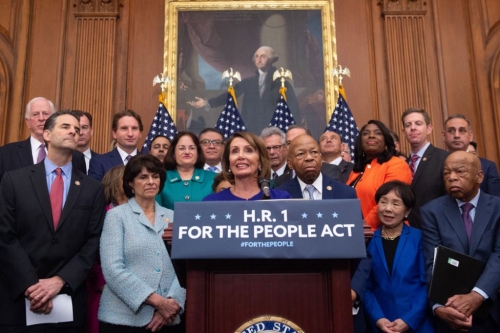Opinion: ‘For the People Act’ would invade Americans’ privacy, stifle free speech
This article originally appeared in The Greenville News.
The First Amendment protects every American’s right to criticize government and join together with fellow citizens in support of a cause. Yet if Congress has its way, exercising these freedoms may soon come with a risk — and a price tag — most can’t afford.
Under the so-called “For the People Act,” known as H.R. 1 in the House and S. 1 in the Senate, Americans who support social or religious causes would have a target painted on their backs. To exercise your rights to speak, assemble, and petition the government, you might have to sacrifice your right to privacy.
The 800-plus page bill would impose campaign finance regulations on groups that so much as name a candidate or elected official in their communications. To be clear: campaign contributions are already publicly disclosed. The new rules are not for political groups or candidates, and they are not just for advertising. The legislation is written so broadly that even a church group or nonpartisan nonprofit’s own website, tweets, or Facebook posts could be regulated like campaign ads.
The bill would publicly expose many nonprofit supporters, threatening religious minorities and groups with unpopular views. Without the shield of privacy, Americans would be far more vulnerable to harassment and discrimination for their beliefs. That’s precisely why the Supreme Court ruled unanimously in favor of citizen privacy in the seminal 1958 case NAACP v. Alabama. This decision prevented the state from compelling the NAACP to disclose its list of supporters, a ruling that might well for some have been a matter of literal life or death.
For more than half a century, this decision has protected Americans’ ability to privately join and support nonprofits. But it is under threat both in the states, where a California demand for donor lists is headed to the Supreme Court, and in Congress. If these threats succeed, nonprofits will be deprived of essential resources and Americans would be driven into silence.
S. 1 would be devastating to civic groups on the left and right. Americans rely on these organizations to monitor government and speak up on their behalf. They must be able to call on public leaders to act, and to blow the whistle on wrongdoing. Yet under S.1, only groups that can afford high-priced attorneys would be able to speak.
Nonprofits that want to participate in public discussions would have to sacrifice their supporters’ privacy and publicly expose their major contributors, simply for calling on citizens to contact their senators about a bill or issue. In some cases, nonprofits that mention an elected official’s name in an ad would be required to report if they support or oppose the official, even if the ad had nothing to do with his or her candidacy.
These provisions would dump fuel on the fire of today’s cancel culture. Americans would suffer harassment and retaliation for their beliefs, which is unacceptable in a free republic. Just as we vote in private booths, we must be able to exercise our First Amendment rights without the government monitoring us.
The House passed H.R. 1 despite opposition from every Republican and one Democrat. It is promoted as a voting rights bill, but don’t be fooled. This is the most serious attack in a generation on your right to criticize government.
Americans have a right to the privacy of their beliefs and consciences. Exposure of a group’s major contributors harms and could effectively silence everyone who supports the group’s mission, including small donors and those who cannot give. As a group’s top supporters dwindle in the face of intimidation tactics, internet mobs, and boycotts, the group would become less effective at advocating for all of its members.
If the Senate passes S. 1, many nonprofits would stop speaking about politicians out of concern for their supporters’ safety. Groups that challenge the status quo, and groups that rarely involve themselves in politics, would be among those most affected.
Meanwhile, wealthy interests that seek to influence government would not miss a beat. Lobbyists and lawyers would be hunting for loopholes as average citizens are left scratching their heads.
S. 1’s invasions of privacy and restrictions on speech are the worst possible prescription for our country. Congress can’t empower the people by suppressing the people’s speech. It can’t improve democracy by making enemies’ lists of supporters of causes it dislikes.
If the Senate truly wants to do something “For the People,” it should stand up for the people’s rights. Reject S. 1 and preserve the First Amendment.
Ellen Weaver is the president of Palmetto Promise Institute, a nonprofit public policy research and education organization.






